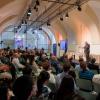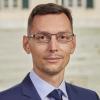
The Need for International Scientific Cooperation and Multilateralism
More than ever before global complex problems require global multilateral solutions sought with joint efforts of the research community worldwide. There is a need for international scientific cooperation and multilateralism, based on key principles of dialogue, inclusion, and solidarity to ensure sustainable and prosperous future for all.
IIASA organized this Science Diplomacy Event to discuss the crucial role of the international scientific cooperation in enabling researchers to access additional expertise and gain new perspectives on research, unlocking scientific discoveries, and promoting scientific advancement for the benefit and interest of all humankind.
This event also looked into how international scientific cooperation helps countries to build stronger relations and how it contributes with evidence-based solutions to international negotiations. The Vienna Statement on Science Diplomacy emerged from discussions held during the event.
Program:
17:00-17:10 Welcome remarks by
- Michael Clegg, Chair of the Council of the International Institute for Applied Systems Analysis (IIASA)
- Teresa Indjein, Director General for International Cultural Relations at the Federal Ministry for European and International Affairs of the Republic of Austria
- Albert van Jaarsveld, Director General of the International Institute for Applied Systems Analysis (IIASA)
17:10-17:15 Opening speech by
- H.E. Ban Ki-moon, 8th UN Secretary-General, Co-chair of the Ban Ki-moon Centre for Global Citizens (video message)
17:15-17:30 Keynote presentation by
- H.E. Tarja Halonen, 11th President of the Republic of Finland, Member of the UN Secretary-General’s High-Level Advisory Board on Mediation
17:30-17:45 Keynote presentation by
- Jeffrey Sachs, Director of the Center for Sustainable Development at Columbia University (remotely)
17:45-18:45 Panel Discussion “International scientific cooperation as a sine qua non for the global sustainable development” with
- Sir Peter Gluckman, President of the International Science Council (ISC) (remotely)
- Albert van Jaarsveld, Director General of the International Institute for Applied Systems Analysis (IIASA)
- Romain Murenzi, Executive Director of The World Academy of Sciences (TWAS) (on behalf of UNESCO Director-General)
- Paul W. Meerts, Senior Research Associate at Clingendael – the Netherlands Institute of International Relations, Visiting Professor at the College of Europe in Bruges
- Christian Koeberl, Professor, University of Vienna; IIASA Council member for Austria
- Moderator - Jan Marco Mueller, Science & Technology Advisor, European External Action Service (EEAS)
18:45-18:50 Closing remarks by
- Sir Peter Gluckman, President of the International Science Council (ISC)
19:00 Reception
Upcoming Events
Potsdam Institute for Climate Impact Research (PIK) & Online
German IIASA Networking Event: "Systems analysis for a sustainable and peaceful future"
Online and Austrian Academy of Sciences (Doktor-Ignaz-Seipel-Platz 2, Vienna)
Human Agency to Navigate the Anthropocene
Humboldt University of Berlin

